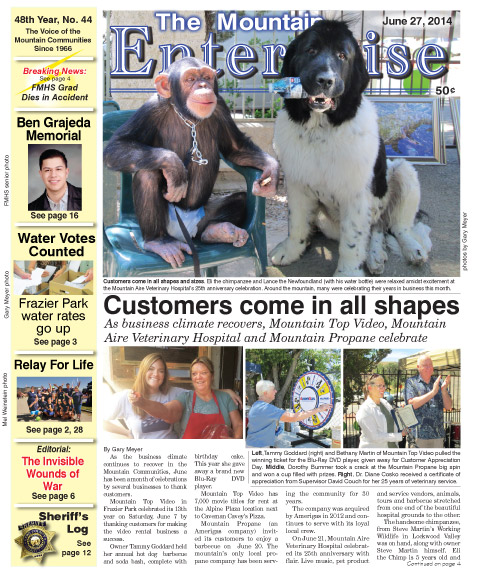(WASHINGTON, D.C., June 25, 2014)
By Patric Hedlund—
Last week “The Long Thin Line of Personal Anguish” was the final powerful column in a series we’ve published this month by the World War II journalist Ernie Pyle. He wrote about the astonishing invasion of the coast of Normandy by Allied forces in June 1944 to turn the tide, leading to the defeat of the German Nazis and ultimately to the collapse of the Axis powers, including imperial Japan, by 1947.
But, as Pyle pointed out, in its aftermath, the horrible waste of war is a global, a national and a personal fact.
This week I am writing and editing this newspaper from Washington, D.C. I was invited to attend a symposium presented by the American Legion at the Institute of Medicine of the National Academies of Science, titled “Advancing Care and Treatments for Veterans with TBI and PTSD.”
Stars and Stripes newspaper was there, along with CBS Evening News and The Mountain Enterprise. Military.com was a sponsor.
As most know by now, the acronym TBI stands for traumatic brain injury. PTSD is post-traumatic stress disorder, two medical conditions that these wars have finally brought out of the shadows and into broader public awareness as issues which are not isolated to soldiers.
TBI is now being recognized as a hazard in the National Football League and on our school playing fields throughout America. The effects of PTSD are seen in people who suffer terrible car crashes or domestic violence, sexual assault or who live in places where random crime and gang violence can be part of children’s daily lives.
Acknowledging the widespread impact of these conditions is a first step to doing something about them in an effective way.
One of our goals for our readers was to follow up on Ernie Pyle’s observations for another generation, to bring the message home regarding our local veterans and their families who often need many services after deployment.
At the symposium, Dr. Warren Lockett, Deputy Secretary for Clinical and Program Policy at the U.S. Department of Defense spoke about the “invisible wounds of war.” The U.S. Department of Veterans Affairs’ National Center for PTSD reminded us that June is PTSD Awareness Month. They suggest six steps that sound simple, but could have a major positive impact if all levels of society implemented them. Their suggestions for this month?
1) Discover the facts. Learn the PTSD basics, with key information about trauma.
2) Watch and learn. Take the mystery out of PTSD treatment.
3) Connect and reach out to someone.
4) Work together. This is the intent of the American Legion’s gathering and their action in response to revelations about falsified records regarding service to veterans at VA hospitals.
5) Give support. Get Support. “It can be hard to reach out for help but we can overcome barriers to care, and know that there is support for family and friends too.”
A major thrust of the symposium was about support for families and caregivers. The message about the importance of supporting communities was explored in varied and vital ways. I’ll write more about that in coming columns.
6) Share what you learn. Stay up-to-date and ask questions about PTSD. In that spirit, 25 speakers came together for the American Legion’s symposium, to share information and to join forces. The National Institute of Medicine reported data from its final report “Treatment for Post Traumatic Stress Disorder in Military and Veteran Populations.” The Rand Corporation provided updates on its surveys of caregivers and the support that families and friends need in caring for seniors or veterans or others with disabilities. The American Legion also unveiled the results of its recent survey on veterans and VA healthcare.
We’ll be exploring the results of these important conversations in this ongoing series. To Be Continued
___________
This section was removed from the story above, but included in the June 27, 2014 issue of the printed newspaper:
In our times, we have had a dozen years at war in Afghanistan and Iraq, spending over a trillion dollars and thousands of lives, leaving many questions unanswered about what has been gained. One of my nephews is in Afghanistan now. Many of our readers or their children are veterans of multiple deployments in the Middle East. The life of each of us has been changed because of 9/11.
And now it seems the tide has turned in another brutal direction in the Middle East. Before we’ve even come to grips with the debt incurred for the future cost to provide services to the veterans who have gone to war on our behalf, there is urging from some sectors to become engaged again.
This is part of the June 27, 2014 online edition of The Mountain Enterprise.
Have an opinion on this matter? We'd like to hear from you.


